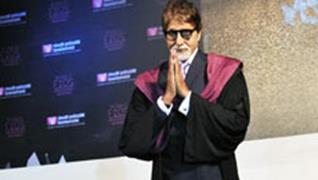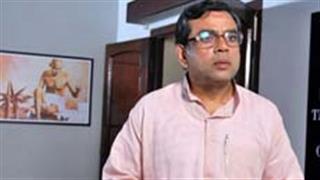Abdul Hai 'Sahir' occupies a notable niche in the Hindi film industry. From Raj Kapoor to Amitabh Bachchan, from Vyjanthimala to Neetu Singh, some of the most memorable songs of every prominent Bollywood actor over three decades owe their appeal to Sahir's magic lyrics.
But Sahir was far more than a song-writer, he was among the leading poets of his generation, which included Kaifi Azmi, Ali Sardar Jafri and Majrooh Sultanpuri, capable of expressing the most exquisite romantic thoughts as well as incendiary outbursts against oppression and inequity. And he opens up in "Parchhaiyaan" - named after Sahir's second published work of poetry - and written and directed by Urdu writer Suhail Akhtar Warsi.
The play begins with Sahir, towards the end of his life, mulling over its trajectory and various highs and lows - his rebellion against his landed family, his father's ill-treatment of his mother, his first romance at school and the subsequent expulsion, his involvement in the Progressive Writers Movement in Lahore and the freedom struggle, Independence and the Partition, his escape from Lahore to then Bombay (after the Pakistan government sought to arrest him) and his long sojourn in the Indian film industry.
In Bollywood, his biggest legacy, he himself notes in the play, was ensuring equality for the lyricist on par with the singer and the music composer - even as far as the remuneration was concerned, recalling asking one producer for one rupee more than the singer was getting.

As he notes, if a writer has to sell his thought and art, then he should be most adequately composed - "it (the art) should be weighed on scales of silver..."
Interspersed with his recollections, featuring a younger Sahir and his first love (only referred to as 'She'), were many of Sahir's most famous compositions like "Main pal do pal ka shayar hoon/Main har ek pal ka shayar hoon" ("Kabhie Kabhie"), "Allah tero naam, Ishwar tero naam" and "Main zindagi ka saath" ("Hum Dono"), "Na to karwan ka talaash hai" ("Barsaat ki Raat"), "Laaga chunri mein daag" ("Daag") and `Saathi Haath Badhana` and `Yeh desh hai veer jawaano ka` ("Naya Daur").
The songs were complemented with spirited dances put on by students of the Genesis Global School, the venue.
In carefully modulated and chaste Urdu, delivered in his trademark baritone, Tom Alter was Sahir all over - a remarkable transformation for an actor who began his career as the stereotypical British Raj official, but over the years, even graduated to portraying Mughal emperor Bahadur Shah Zafar and now this maverick poet from Punjab.





















